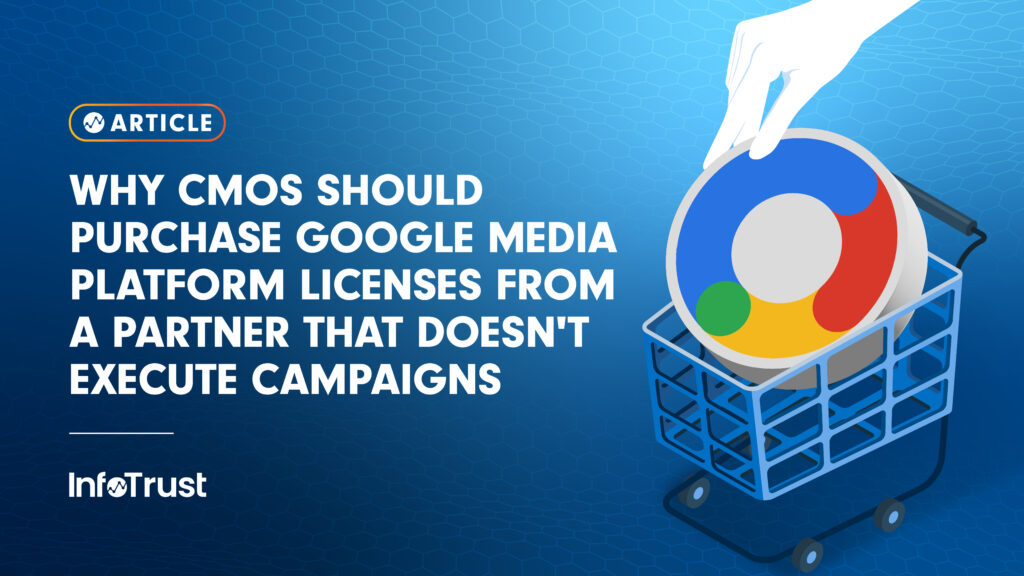So you’ve made the decision to use a reseller and control your own DV360 or CM360 license, instead of accessing these platforms through your agency. You probably did this based on a number of factors, including ownership of your data, ability to influence how the platforms are used, and ease of future portability, among others.
But how do you choose between resellers?
Choosing the Right Reseller: Key Factors Beyond the Basics
Of course, it’s important to ensure that the right partner meets your requirements around technical competence, level of service, geographic coverage, and price. But beyond those more easily comparable factors, there are other, more strategic aspects that cut closer to the DNA of each partner that are also vital to consider. These factors relate to the core focus of each company and its ability to provide truly unbiased advice.
Many Google Marketing Platform (GMP) Sales partners are part of agency holding companies that take principal positions in media buying, which inevitably creates incentives to direct spend to particular publishers in order to reach agreed volume targets or to certain types of inventory that generate higher margins for the agency. As an advertiser, it is imperative to mitigate potentially misaligned incentives from your experts’ advice, ensuring that actions maximize benefits to your company.
The remaining sales partners (those that are not part of holding companies) almost always provide both license reselling and media management services, such as media planning and campaign management, and optimization. This might initially seem like a positive, since it makes it convenient to receive licenses, media buying, and strategy from a single company, often for an all-inclusive fee based on the percentage of media spent. However, while it is tempting to bundle everything together, the same considerations that led to your preference for a GMP reseller in the first place, should be at play here, namely: transparency and objectivity. At a minimum, if you do choose the same partner for both the license and media management, you should insist on total transparency and a clear distinction between the cost of the license and the cost of additional services provided.
While requiring this fee transparency may reduce the direct link between media spend and size of fees, it does not remove the fact that the company that is advising on and directly managing your media spend will directly benefit any time that spend is increased. In addition–and just as importantly–by controlling both the platform access and the media operations, the same partner will also provide all the reporting and measurement of the results of the marketing activities it manages, effectively marking its own homework. When coupled with the incentive to drive higher media spend, this creates an unfavorable situation for the marketer.
The Dual-Partner Model: A Path to Greater Accountability
A better solution would be to remove this problem altogether by assigning a technology partner to provide the platform license and support while an agency partner provides hands-on campaign management and optimization. Such a setup ensures transparency, no mixed incentives, and greatly increases impartial advice. It also drives accountability, as the technology partner can easily provide additional oversight on the outcomes managed by the agency. Conversely, if the technology partner provides you with value-added data and analytics services such as customer value models, the agency can ensure that the results of their activation in the platforms will be objectively evaluated (driving positive outcomes for both advertiser and agency). Finally, splitting the technology and media activation roles provides additional flexibility to experiment with hybrid models and bringing different functions in-house than when everything is provided in one monolithic service.
This dual-partner model is very effective in principle, but what happens when the technology partner also offers media management services? In practice, this can create friction between the partners due to lack of trust, especially on the part of the agency partner, who might be concerned that the tech partner will eventually pitch for the media business. I have seen this happen many times in previous companies, often through lack of information sharing, which then leads to suboptimal results for the advertiser or greater overhead required to manage the politics between the partners. At the same time, the solution to this problem is simple: select a tech partner that does not offer campaign management services.
Building Trust: InfoTrust’s Focus on Data, Analytics, and Measurement
At InfoTrust, we made a conscious decision to focus on providing data, analytics, and marketing-centric technology services and solutions such as measurement, staying away from media planning, campaign management, and optimization, despite having built deep capabilities in all of these areas. This puts us in the unique position of being able to work alongside media agencies of all sizes to ensure that our products and solutions drive the best marketing outcomes for our clients.
Throughout our journey, starting from Premier Analytics partner through to Marketing Analytics Cloud Partner and most recently, becoming a GMP Media Platforms reseller, we have continued to focus on what we do best and to build trust with both our clients and the media agencies that work with them every day.


